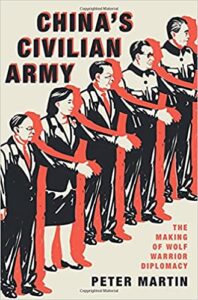How little Lithuania dragged the EU into its showdown with China https://t.co/cQ02OMyY9P
— Democracy Digest (@demdigest) October 7, 2021
China’s aggressive campaign against the Baltic state of Lithuania is a telling indicator of why Beijing is facing its “biggest international backlash in decades.”
Beijing recalled its ambassador, a diplomatic form of protest it hasn’t used for years, and insisted that Lithuania withdraw its envoy. Freight train services connecting Vilnius under China’s Belt and Road Initiative were suspended; so were the new licenses that Lithuanian food exporters were applying for. Initial expectations that Lithuania could become an important EU destination for Chinese fintech investors all but dissipated, POLITICO reports.
“It’s like the classic Chinese saying: ‘Killing a chicken to scare the monkey,'” said a senior EU diplomat in China. “Beijing is sending a message that whoever follows Lithuania’s example, of daring to stand up to it, will face severe consequences. And such a message is best tested on a smaller country.”
 Beijing’s actions are the latest manifestation of what the NED’s International Forum calls China’s sharp power.
Beijing’s actions are the latest manifestation of what the NED’s International Forum calls China’s sharp power.
They also help explain why China is facing its biggest international backlash in decades, adds Peter Martin, the author of China’s Civilian Army: The Making of Wolf Warrior Diplomacy. Negative views of China are near record highs across the developed world, according to a Pew Research Center survey from June, which showed that at least three-quarters of respondents in Australia, Japan, South Korea, Sweden, and the United States now hold broadly negative views of the country, he writes for Foreign Affairs:
Xi’s government has shown no sign that it is willing to alter the state-led industrial policies that have alienated multinational companies, to soften the crackdowns in Xinjiang or Hong Kong, or to compromise on territorial disputes from the Himalayas to the South China Sea. That leaves Chinese diplomats and propagandists with a difficult if not impossible message to sell. But as long as they use Wolf Warrior tactics, they don’t even need to try.
China’s image has also suffered from its heavy-handed suppression of democratic rights and liberties in Hong Kong, observers suggest.
After a sweeping crackdown on pro-democracy opposition in Hong Kong that has seen dozens of activists arrested and jailed, authorities have firmly turned their attention to the city’s civil society groups, VOA reports.

But there are already signs of how civil societies will endure, said Eric Yan-ho Lai, author of the book Unravelling Authoritarian Rule of Law in Hong Kong.
“We can also find this year that for many instances, people will gather themselves to carry out collective consumptions to support some pro-democracy shops or merchants, or they will collectively attend court hearings (in) solidarity with protesters,” he told VOA. “I would say this would be some possible traces the local people are willing to sustain civil society development in these ways.”
The erosion of civil society has continued into October, as Hong Kong’s largest independent trade union disbanded, VOA adds. The Hong Kong Confederation of Trade Unions was formed in 1990 and by this year had 145,000 members. But the group voted Oct. 3 to disband after members received threats to their personal safety.







